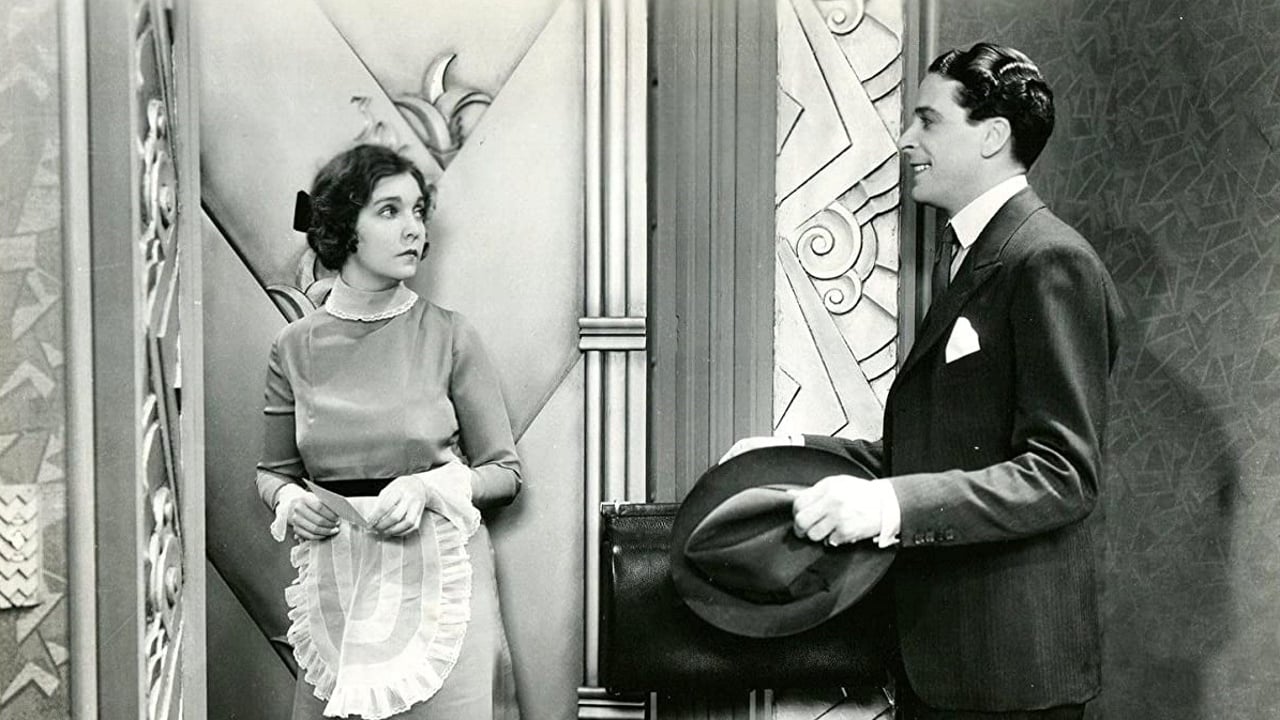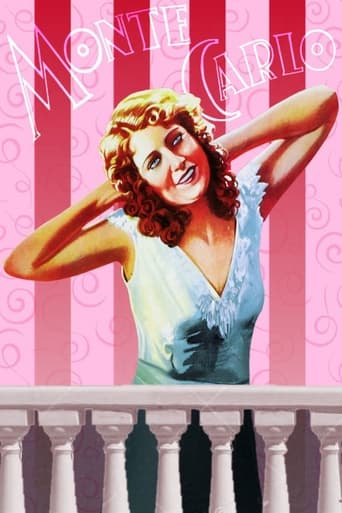Fluentiama
Perfect cast and a good story
Philippa
All of these films share one commonality, that being a kind of emotional center that humanizes a cast of monsters.
Edwin
The storyline feels a little thin and moth-eaten in parts but this sequel is plenty of fun.
Kayden
This is a dark and sometimes deeply uncomfortable drama
jarrodmcdonald-1
In Ernst Lubitsch's Monte Carlo, Jeanette MacDonald is paired with Jack Buchanan, instead of her usual partner Maurice Chevalier. Miss MacDonald's acting is not as sharp as Marlene Dietrich's might have been in the role. The picture needs an amoral diva, and Jeanette is too sweet, too soft to play such a role. The rest of the film is fine and it contains the usual humor associated with a Lubitsch production. The story is about an aristocratic woman (MacDonald) who browbeats and abuses her personal stylist, a male, at every turn (Buchanan). She fires and hires him back countless times, and gradually realizes that she loves him. The irony is that he is a moneyed aristocrat himself, in hiding from his wealthy family. The highly implausible story is saved by the music and inspired direction.
bbmtwist
This is the only one of Lubtisch's five films with MacDonald and Chevalier that can be considered a failure and primarily because of poor casting.There are lovely Lubitsch touches: the red carpet, the rain, the discovery of the missing bride, all without dialogue; the slap and the hair pat; the clock with first trumpet, then tuba, then flute; the elaborate four key locking of her chambers.The error is in casting Jack Buchanan, ugly, effeminate and silly, as her leading man. She runs to him from the equally ugly and effeminate Claude Allister. What were they thinking???? She needed a "man," not someone playing a man. I have no idea of the sexuality of either Buchanan or Allister, but she did not have a "real man" by Hollywood standards to play against, yet did her valiant best, as she always would in all her films. At one point in the dialogue, MacDonald accuses Buchanan of "not being a man at all."I'm not homophobic - I'm a gay man myself, but it must be said, Miss MacDonald was very poorly served in this outing. Yet, there is a grand original score, including two real gems: BEYOND THE BLUE HORIZON and ALWAYS, IN ALL WAYS. Enjoy it for Jeannette, Lubitsch and the songs, despite the non chemistry with her leading man and the long, long dull parts of the play itself.Songs:Day of Days – Chorus She'll Love Me and Like It – Allister BEYOND THE BLUE HORIZON – MacDonald GIVE ME A MOMENT PLEASE – MacDonald and Buchanan Trimmin The Women – Buchanan, Roche, Brooke WHATEVER IT IS, IT'S GRAND – MacDonald and Buchanan YOU'LL LOVE ME AND LIKE IT– reprise – Allister and MacDonald ALWAYS, IN ALL WAYS – MacDonald and Buchanan Give Me A Moment Please – reprise – Buchanan ALWAYS, IN ALL WAYS – reprise –MacDonald and Buchanan BEYOND THE BLUE HORIZON – reprise – MacDonald and BuchananMacDonald sings 5 songs: Beyond The Blue Horizon; Give Me A Moment Please; Whatever It is , It's Grand; You'll Love Me And Like it; Always, In All Ways – plus two reprises.
Neil Doyle
Strictly for devotees of Jeanette MacDonald who have to see every one of her films. Pairing her with leading man Jack Buchanan is a big mistake here. He has neither the looks nor charm to be believable as her love interest.She does get to warble at least one attractive and well-remembered song: "Beyond the Blue Horizon," but all the other musical numbers are patter songs that merely fill in the gaps between some not too witty dialog.The tiresome tale is about a girl who runs away from her wedding and then mistakes a wealthy man (a Count) for a hairdresser. The mistaken identity goes on for almost the entire film without resulting in any real payoffs. Jeanette is her usual charming self but Jack Buchanan is really wasted here and never gets a chance to show what a great tap dancer he was--as in "The Bandwagon" years later with Fred Astaire.This is one even Jeanette's most ardent fans can afford to skip.
Terrell-4
What is there about Lubitsch endings? In this 1930 film Monte Carlo we're in the Monte Carlo opera house watching two people as they watch the end of the operetta, Monsieur Beaucaire. In one box is the handsome and debonair Count Rudolph Falliere. In another box is the beautiful and sad Countess Helene Mara. Monsieur Beaucaire is all about a nobleman who pretends to be a hairdresser so he can be close to and woo a noblewoman. Lubitsch's Monte Carlo is all about…well, a nobleman who pretends to be a hairdresser so he can woo a noblewoman. The situation as it plays out for us observers is amusing, clever and sophisticated. We wind up thinking, because we know what's going on, that perhaps we're amusing, clever and sophisticated, too. It's a wonderful way to end the movie.How we got to this point is just about as amusing as the ending. Countess Helene Mara (Jeanette MacDonald) left her twit of a fiancé, Prince Otto Von Seibenheim (Claude Allister) at the alter. Otto is the product of far too much noble inbreeding. She hops a train with her maid and decides to go to Monte Carlo where she will, of course, make piles of money at the casino. Count Rudolph, a charming and rich fellow, falls for her as soon as he sees her. Without a proper introduction, of course, he decides he must take the place of her hairdresser in order to meet her. Before long, he has also taken the place of her lackey and her chauffeur…and speculates about the moment when he'll take the place of her maid. And pursuing Helene Mara is her fiancé, the dim-witted Prince Otto. There are some songs, some kisses, much nearly transparent lingerie worn fetchingly by Helene Mara, a number of cocked eyebrows by Rudolph (now Paul the hairdresser) and much light-hearted suggestiveness by Lubitsch. "Oh, oh, oh, oh... ohohohoo... that feels good!" says Helene Mara, while her maid listens behind a closed door. "... oh, oh!...that feels even better... you must have electricity in your hands! I've never felt like this before!" Lest we speculate with as much interest as the maid, Paul is merely massaging Helene Mara's scalp. Unlike Monsieur Beaucaire, this couple has a happy ending because, reasonably enough, that's what they want.Jeanette MacDonald gives a first-class performance that combines haughtiness, longing and sexuality. She looks great in her scanties. When she hides the key to her bedroom so that she won't be tempted to open it and let Paul enter, it involves three keys, each smaller than the last, two boxes and a pillow. MacDonald is just as delightful in the morning trying to figure out what she did so she can get the bedroom door unlocked.For modern American audiences, Jack Buchanan probably is something of an acquired taste. In Britain during the late Twenties and Thirties he was a huge star, particularly on the British stage. Critics called him the English Fred Astaire. The upper U accent, the careless confidence, the high-nose nasality, the slight hint of upper-class entitlement are a little dated today. Like many leading men of the Twenties and Thirties, before the style went out of fashion, he seemed to promise for duchesses and shop girls alike days of laughter and nights of exquisite passion, without dwelling too much on the mechanics of that passion. While his style is now dated, watch how he uses inflections, a quick expression, some physical business, how he laughs. Buchanan knew what he was doing and he was good at it. There are several things of his from the Thirties that you can see on YouTube. Nowadays he's better known as having played Jeffrey Cordova in The Bandwagon with Astaire.You'd have to have a severely ingrown toenail not to watch Monte Carlo with a smile, especially that ending.

